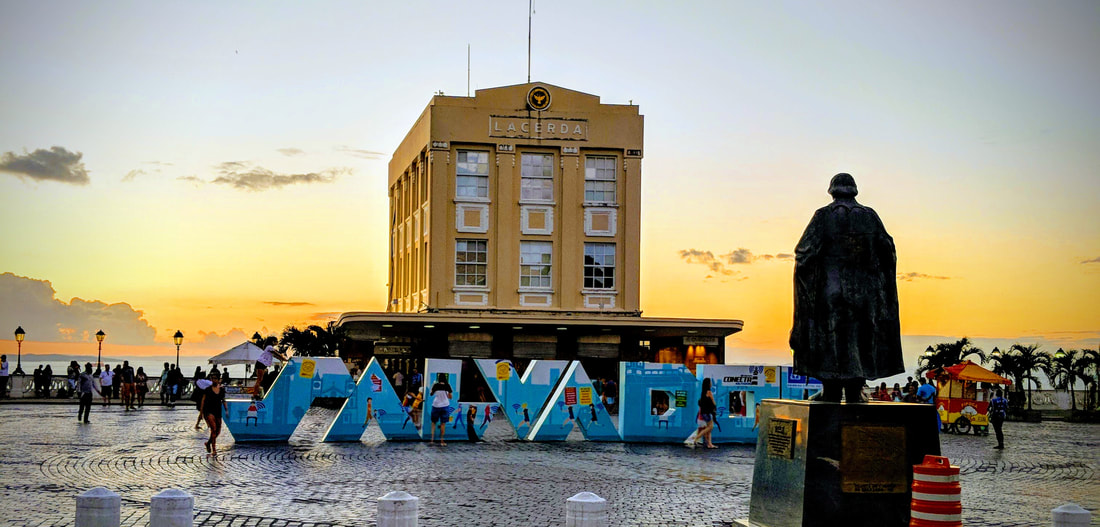|
By Jennifer Agustin Ambrocio
Pedro's Note: Both Jennifer and Ignacio wrote about education, but Ignacio posted an Instagram post about the same experiences. I will share his Instagram Post at the end of this blog post (but you can also click on this link)
Brazil is truly one of a kind, and an experience of its own. Having studied abroad in Mexico, Spain, and Dubai and now Brazil as my fourth trip study abroad. Salvador, Brazil has been amazing, and I wouldn’t change my experience for anything. The first week was a rollercoaster for sure, from spending 24 hours in Chicago for our flight to finally stepping foot in Brazil, that was all that I cared at that moment. These couple days have been full of being engaged and willing to learn about the history, religion, culture, and social issues that Salvador has faced. Therefore, women and children have continued to fight for education, and rights, because even though education is the key to life, that is not always the case for every kid especially in Salvador. As Nelson Mandela once said “Education is the most powerful weapon which you can use to change the world†but if education was free for all, being debt free, where materials are provided, and teachers are actually paid what they are supposed to be too.
During our second week here we visited Escola Aberta do Calabar to interact with teachers and the kids. It was a very bright and vibrant place where all the kids were getting along no matter what age, or gender you were, everyone included everyone. One of the teachers showed us a tour of the school and got to explain a little more about what these kids learn even though it might not seem as a typical school as in the United States. At Escola Aberta do Calabar, many of the school supplies come from donations and kids take courses that will actually serve them in life such as knowing how to sew, being taught social issues, the real history of Brazil, and where many of these kids get to chance to attend the school without having to pay for fees such as the public and private schools in Bahia. This school was in a low-class neighborhood, where many of the kids there attended this school and shows that “in the 21st century, Bahia is a state marked by racial inequality, the poverty of a large part of the population, and state violence, paradoxically associated with the strong presence of traditions of African origin and a rich and dense popular cultural life, as in other parts of the African diaspora†(Osmundo, 1). So far I have seen racial inequality through my time here in Bahia, where colorism is one of the biggest issues that Brazilians without to say that throughout “Brazilian history, black culture (later coded as popular, peripheral, or favelada, which means from the slums, favelas) has been the object of repression, violence, disdain, panic, and anxiety, from the point of view of dominant white consciousness, as demonstrated in the case of Bahia†(Osmundo, 3).
We also had a lecture from the director of Instituto Cultural Steve Biko, Jucy Silva. Instituto Cultural Steve Biko is a school that serves students black especially those that want to pursue a higher education and degree, where students are taught ethnic-racial diversity and view the world named after the South African leader, Steve Biko, a great reference in the fight against Apartheid in South Africa (Instituto Cultural Steve Biko). The schools' mission is to promote political and social ascension of the black population through education and appreciate their history, but most importantly how to be black (Silva, 2024). I’m thankful there are these institutions in Bahia and hope there might be something similar in the United States, since “Bahia is the Brazilian state with the highest absolute numbers of poor people (6.3 million) and extremely poor people (1.9 million), among which families headed by black women are overrepresented (Osmundo, 3). Even though these institutions serve those underrepresented in Salvador, many of the students go to the stages of their school career where they deal with stress, anxiety, depression, and such that affect their mental health (Mota, 2024). Something that surprised me was that many of the students go to work, and also go to school, which is something I would also do as a underrepresented student on campus but it's something that I must be grateful for since my parents have told me to focus on school because that is my only job. Both institutions have English classes for students to take advantage of kids being taught English classes is way to become more knowledge with those around them, but also a way to communicate with those as it is seen as an advantage later in life. Which I can relate as a Mexican American because my second language is also English and as a Spanish speaker I tend to try and practice both, so I don't forget them. We as Americans don't realize that education is such an important part of our life to get where we want and what goals we want to achieve whether it be a specific job/career or anything else that could give us an extra advantage. ​Sources Pinho, Osmundo. "Race and Cultural Politics in Bahia." Oxford Research Encyclopedia of Latin American History. 17 Dec. 2020; Accessed 26 May. 2024. https://oxfordre.com/latinamericanhistory/view/10.1093/acrefore/9780199366439.001.0001/acrefore-9780199366439-e-946. Instituto Cultural Steve Biko - https://www.stevebiko.org.br/index.php Director Jucy Silva’s Presentation, Thursday May 23rd Professors Clarice Mota’s Presentation, Friday May 24th 
Jennifer Agustin Ambrocio is a Senior at the College of Saint Benedict, double majoring in Political Science and Hispanic Studies with a minor in Latin Latino American Studies. She is originally from Bloomington, Minnesota. Jennifer enjoys watching and reading the news at a international level. She studied abroad 3 times already, and Brazil will be the 4th time
IGNACIO'S POST
0 Comments
Leave a Reply. |
Archives
June 2024
Categories
All
|



 RSS Feed
RSS Feed
